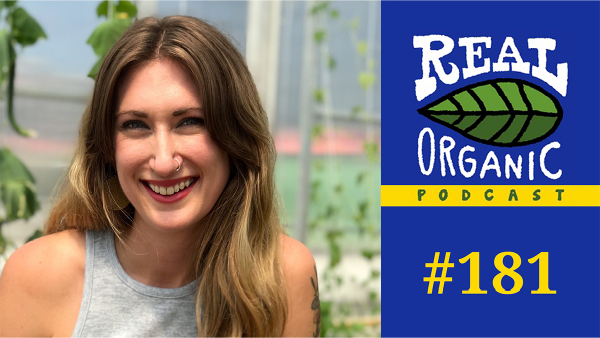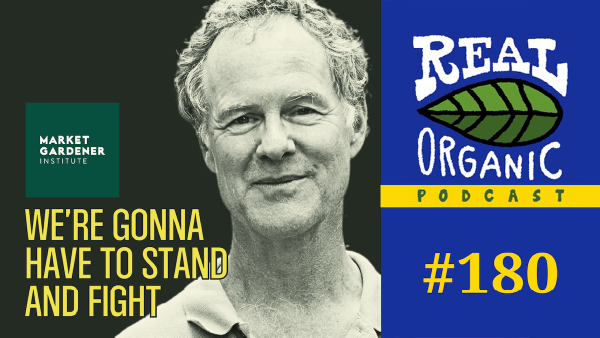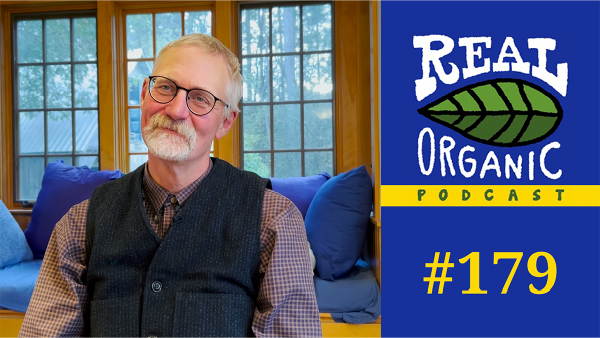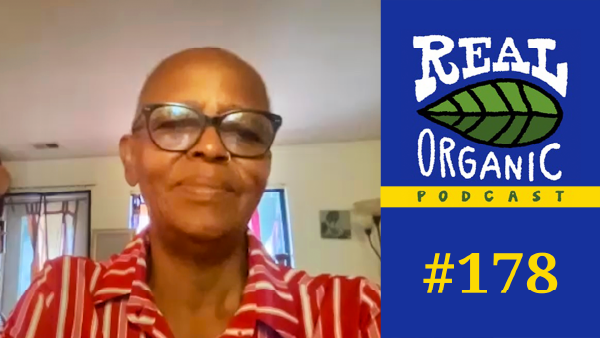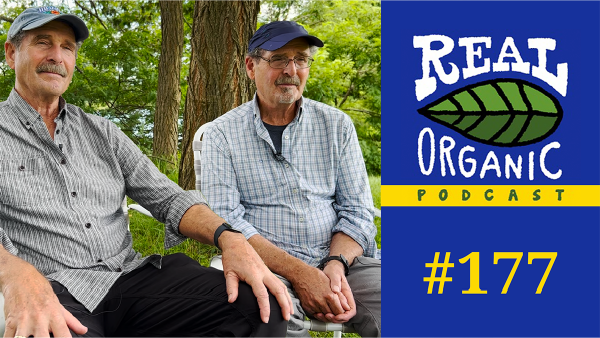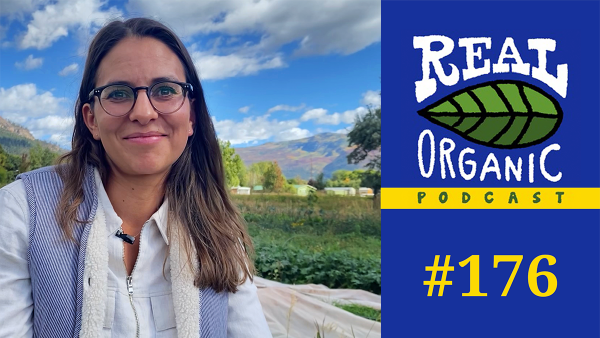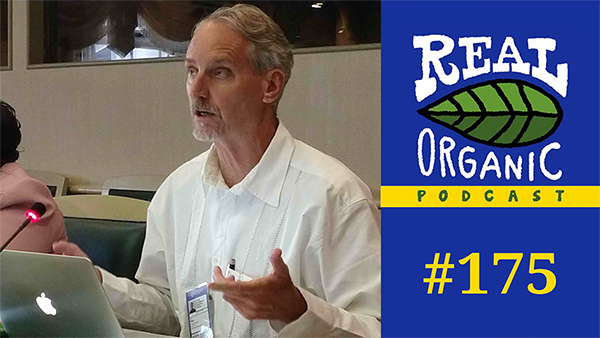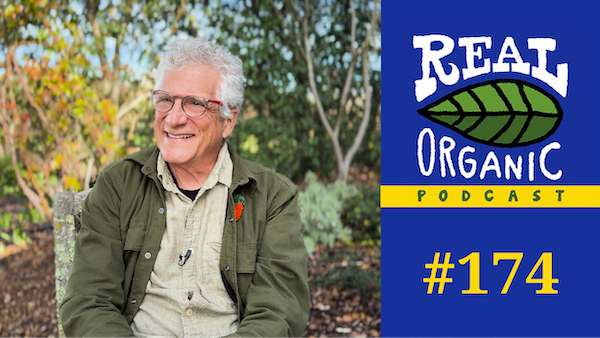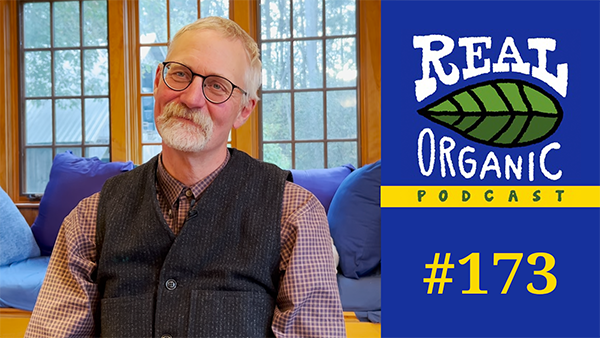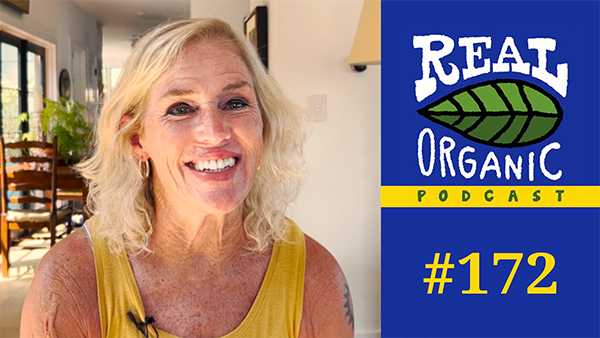Episode #016
Kat Taylor: How to Grow Good Money + Good Food for All
Welcome! You can subscribe and download episodes of our show through your favorite podcast app.
You can also subscribe to receive the video version of each episode on our YouTube channel.
Our Kat Taylor interview has been edited and condensed for clarity.
Dave Chapman: Hello, and welcome to the Real Organic Podcast. I’m talking today with Kat Taylor. Hello Kat. It’s a real privilege to talk with you. I’m so glad that we were able to get this together. Kat is the co-founder of Beneficial State Bank and also of TomKat Ranch with her husband and partner, Tom Steyer., You are a very engaged social and climate activist.
Kat Taylor: Thank you David, this is a great opportunity. Thanks for inviting me.
Dave Chapman: Sure. So, you know, in the, in the Symposium, you really represent a unique- a triad of perspectives. We have some people who are connected to agriculture and also to climate activism, but you’re the only one who brings in banking, which I actually think is important. So can we talk about how you decided to become a banker? Cause I don’t think that’s exactly where you started. You didn’t go to college going “I want to be a banker.”
Kat Taylor: A little bit I did,, but yes, I think banking is super important. As Bill McKibben entitled one of his latest articles, “Finances Is The Oxygen Burning Down The World.” Because finance is, by my calculations, the largest industry in the world, it drives societal outcomes not just economic ones. And we’re finding out, as Martin Luther King said that all the human and civil rights victories are somewhat hollow if we don’t also have economic fairness and equity. So I think probably my motivation stems in part from my earliest memory, which was of the so-called civil rights funerals. That’s what I call them – the funerals of JFK, Bobby Kennedy, Martin Luther King, and Malcolm X. Because I was five years old at the first one and I had an innate sense that something was terribly wrong in our country from the somberness of the adults.
And then from learning, imperfectly I might add in my public education – no slam on public education, I just don’t think we’ve taught the history of our country honestly, but I did get that slavery and Native genocide, persecution of immigrants and refugees, less than personhood for women, degradation of our ecological commons was really..those were the sins of our origin. Until we fix those, the world would not be right, particularly with America’s leadership in the world. So while I didn’t understand how a white girl with privilege would end up helping the civil rights movement, I was looking for the opportunity. And I recognized it at the formation of the great, socially-responsible banks (those would be South Shore Bank, Grameen bank Self-Help Credit Union, et cetera), in the seventies, that banking was a really important lever and determinant of our social, economic, racial, and environmental agenda.
Dave Chapman: Okay. I’ve heard you give a number of talks to bankers, so here’s your chance to talk to a bunch of farmers and eaters. So tell an uneducated guy, why is banking important?
Kat Taylor: Yeah, so I’m one of those uneducated guys as well, because I’m a naif, I didn’t spend my whole career in banking. My family was in banking, so I had a couple summers exposure to it, but I’m approaching this as a lay person as well. So to break down why banking is important and what it’s actually supposed to do, I think about it in terms of it being the original and most powerful form of crowdfunding; not that a specific deposit funds a specific loan, but all deposits fund a lending practice. And that lending practice really matters. And by all rights, I think depositers should get to let their money fund a lending practice that they can be proud of. So we’ve been trying to awaken the agency and accountability of bank customers – that would be agency meaning choice – that you do have choice. You don’t have to bank with a bank that’s disregarding your basic values and you have accountability or responsibility because you’re inevitably associated with the outcomes of that lending practice, if you allow your deposits to fuel it.
Dave Chapman: You’re suggesting that banks are different and that some banks actually can have a very positive effect on society. And some banks actually can have a negative impact on society. Did I get that right?
Kat Taylor: So if you think about it, if your bank is lending into fossil fuels, private prisons, and predatory lending, you’re associated with that, and likely you don’t agree with those outcomes because it’s accelerating Climate Change. It’s implicated in mass incarceration, especially of Black Americans and it’s bilking people out of their money through a debt trap and sneaky banking products or non-banking products. Because a lot of payday lending is done by non-bank institutions.
Dave Chapman: And I’m curious, you’re working on changing these large systemic forces. How much of that do you see as being regulatory reform and how much of that do you see as being you know consumer uprising? Saying, instead of going to this bank, I’m going to go to the bank that shares my values. So that’s a little bit different from saying I’m going to write my congress person. And I, I don’t think that the regulatory reform works very well until we get the voter uprising. But I’m just curious, do you feel that your efforts are focused more on one than the other?
Kat Taylor: So thank you, because you just sort of foreshadowed what our theory of change is and how we go about trying to affect the change. And it’s a three-fold strategy, two of which you just named. So we are working with movement builders to get consumers to vote with their money. So to take their money out of banks that are disrespecting their values and crashing our planet and being racially and gender unjust and to move it to an institution that’s respecting their values. So that’s the kind of consumer movement you’ve seen evidence of, for instance, in the Dakota access pipeline protests. The leaders of that movement recognized early that banks were a culpable in the financing of the pipeline. And so they encouraged depositors to move their money, and they moved it in the millions of dollars. I think something like $80 million left in the first four weeks, and that’s still tiny in comparison to the size of the banking industry.
At any point in time, there’s something like $12 or $13 trillion of deposits in the American banking system alone. So it’s quite incremental, but it’s symbolic. And it’s important in terms of motivating consumers who actually have the power to vote with their money and make change. Then the second tactic is actually to work with other financial institutions and try to convince them that for enlightened self-interest, they should migrate to a banking model more like ours, which has a triple bottom line. We are mandated to achieve racial and social justice, environmental wellbeing, and financial sustainability. So we built a bank model that we have to prove can compete in the marketplace and be solvent and financially resilient. And because then we want banks to think “oh, we can bank like that. And we should bank like that” because of three things, they’ll get more deposits because people will vote with their money and give them their deposits.
They’ll get more equity capital, because if you think about Divest Invest, we know that movement to divest from fossil fuels, private prisons, et cetera. We know what we’re getting out of. We have less clarity on what we can get into and investing in a bank is really powerful for all the reasons I said. And if it’s a bank with a triple bottom line, even better, so that those kinds of banks can attract more low cost equity by doing that. And then the third thing that they want is human capital: deposit equity and human capital. We get remarkable young people to work at the bank and the bank foundation that owns the bank when they would likely never work for a bank that wasn’t respecting their values. So having a competitive edge, or human capital, is really meaningful in any industry, but maybe especially banking.
Dave Chapman: Sure, sure. So the things you’re talking about are very reminiscent for me of the issues we’re dealing with in the Real Organic Project. And there is an ongoing discussion about, “are we trying to reform the USDA, the National Organic Program, or are we trying to create an alternative?” And I have taken the position that we have to create an alternative in order..in a format that there needs to be a movement before there’s reform. We can’t expect the reform to come first when it’s in opposition to big corporate interests, it just isn’t going to work unless there’s a lot of people. I’m curious, you talk about people moving $80 million and that that’s not a big deal on one level, but on another level, I can imagine that banks might have been quite concerned not by the loss of the $80 million, but by the tipping point. You know, the spark that this might be? I’m sure that there was a lot of attention paid to that. Is that right?
Kat Taylor: I can vouch that the whole industry took a look at that and, you know, sat up and thought,”oh, we need to pay attention to this because it could represent a movement that soils our reputation at a minimum, or maybe even threatens our business model.” But I did know that Bank of the West shortly after that made a pledge to pay all their workers at least $15 an hour. And that’s contrasted with a third of the tellers in the banking industry needing to rely on public support, because they can’t live on the wages they’re paid. And then Bank of the West also said they would divest from fossil fuels on I think a five-year timeframe. So, that was maybe influenced by Dakota Access Pipeline and other mass movements where they thought “the market opportunity is moving and I need to move the business model with it.”
Dave Chapman: Do you think that success, when you imagine what you’re doing is.. There’s a term I heard from Meg Wheatley called Islands of Sanity. I can’t remember if had you used that term.
Kat Taylor: No, it’s a wonderful expression.
Dave Chapman: And she actually thinks things are going to get pretty bad, but we need to create Islands of Sanity in order to have something good grow out of what might be quite a lot of catastrophe. And I like the term, I think it’s good. Do you think that as you are creating, you are consciously working on creating islands of sanity, whatever you call them, do you think that that model will be taken up by the huge banks going and saying, “oh, we need to change” or do you think it will be smaller regional banks that might say “there’s an opportunity for us? Let’s let’s change who we are in order to create a genuine alternative.”
Kat Taylor: So I think we recognized early on that we’re not changing the behemoth institutions, the giant money center banks. They’re a little bit locked in place like the dinosaurs. So, our focus is on regional banks who have more facility to change. More agility if you will. And I, I love that expression Islands of Sanity. I had not even heard it before, but it reminds me of Duane Elgin, the futurist who talks about, I think it’s the Seven Stages of Awakening.About us creating a new human civilization that’s much more concentrated, is local in its effect, even though it’s globally connected. So I think a more distributed system is in the offing and is where we should go. Because it’s more easy to be accountable if you have market. Can you really understand the communities that you’re serving and so on? And maybe those are the Islands that persist, to me, as being on the verge of collapse, which sounds oh,-my-God-devastating and depressing, but actually creates new opportunity sets. I believe Leonard Cohen said, “look for the cracks that’s, that’s where the light gets in.” I think that’s true across the entire landscape of human activity right now. And we should take advantage of those openings to make real change.
Dave Chapman: Did you read or listen to a 1619, the New York times series?
Kat Taylor: Yeah, yeah, yeah. It was really good. I thought. And I wished it went on and on and on.
Dave Chapman: I know I was like, “that’s it? You’re going to stop there?” It was excellent. The first session for me was so thought provoking about low road capitalism and that our capitalism in America really grew absolutely, directly out of slavery. And the Northern banks were very involved in this, you know, that human slaves were the highest asset in the American economy. And that as a result of that, our capitalism isn’t very nice. It’s not very concerned with the greater common good. And I’ve seen it suggested that Adam Smith would be very unhappy for his ideas to be claimed by modern capitalism in America, because he actually believed that this was to lift all people up.
Kat Taylor: Adam Smith didn’t think the economy or markets are what create beneficial human civilization. He thought they were a tool along the way and that it’s actually our cultural and religious institutions that give us our value system. And then we’re supposed to make the economy heed to our value system, which we have not done. We’ve allowed it to be the be-all and end-all you know,? That it’ somehow is this immutable force that we’re supposed to obey, when in fact we’re the source of rules that it should obey.
Dave Chapman: So do you think that we can grow a saner capitalism?
Kat Taylor: Yes. And I wouldn’t be in banking if I didn’t believe that was true. I take your premise as absolutely true that our version of capitalism, especially in America, is based on colonialization and extractive in the extreme; extractive of life, land, labor, everything. And that the economy was based on that and allowed us to sort of leapfrog the other major countries of the world. And by the way, keep Africa down too, which could have been a mighty competitor in the world arena if we hadn’t stolen all those human beings and then colonized it after the war. The opportunities to change capitalism, I think, are more real now than they have been in a long time. I have never agreed with Milton Friedman’s proposition that the only responsibility of the corporation is to maximize shareholder value.
I think that’s complete poppy, but that was taught in all American business schools, at least when I went to them in the early eighties. I think it still persists, but there’s challenges to what the role of the corporation is. And more importantly, what the responsibilities of the corporation are. I fancy regimes like the B corporations that take an affirmative commitment to meet many more values than just profit maximization and hold themselves responsible to a third party audit every other year to make sure that all of their practices are consistent with high road; employment environmental respect consumer safety, and all sorts of other values. That’s a voluntary regime, of course. And even though it’s grown, I think that maybe it’s at 4,000 companies – once again, it’s incremental, it’s symbolic, and it could initiate a wave of consumer awareness about the corporations that they are willing to do business with.
And maybe some regulatory moves to hold corporations responsible for their externalities, those harms that they voiced outside of their corporate boundaries. I sound a little bit fantastical and naive, I would imagine. But put it this way: if we don’t change capitalism to be more caring and conscious, it’s going to kill us and the world will spit us out like a watermelon seed and keep on going. And they’ll be better off without the human species until we clean up our act, I mean, the rest of the world creatures and systems. So I work every day to try and do my part to change capitalism, into something that’s more humane and more sustainable.
Dave Chapman: We got our work cut out for us as humans. We really do. So before we leave this, I’d like to go to food, but before we do, you talk about really participating in the New Economy. So could you talk about that please? What’s the New Economy?
Kat Taylor: The so-called definition that we use is that a New Economy will be fully inclusive, racially and gender just, and environmentally restorative; not neutral, but actually repairing our ecological commons. I’m in favor of reparations, so I think that has to be an element of it all. And in terms of inclusion, I think we have to be open to the possibility that brand new companies, much more tailored to unique customer need will be part of that. So we keep our eyes open to the banking industry for FinTech disruption to see, is it a better value proposition for the consumer?
Dave Chapman: So you said “we stand in this economy to get to the next” – it’s wonderful. Could you explain that Kat?
Kat Taylor: I believe we have to reform capitalism as opposed to scrap it and start with something else. I just don’t believe that we will be able to start fresh with a blank canvas. And there are elements of capitalism that are pretty good at doing efficiency, capital allocation, and so on. It’s just that we haven’t infused it with enough of our values and held it accountable to non-financial ends. So that’s why I say we’re standing in a bad system that needs reform to get to a better system.
Dave Chapman: Yeah, yeah. Your core values of Beneficial Bank, which I like, cause I consider them the core values of the Real Organic Project are: trust, justice empowerment, and you added creativity. So,ou said without trust your bank does not succeed.
Kat Taylor: I mean, fundamentally, nobody will put their money with us if they don’t trust us. But I think that trust in our case goes beyond just safety and soundness and honesty. They’re trusting us to build a better world. Then the justice, because we have just such an unjust economy and a history filled with injustice that persists today. So I love this cartoon called the Real American Dream where it shows an African-American young man starting out on a game board that has the most circuitous route with many, many pitfalls and assaults. And he’s on one starting line. And on a parallel starting line is a white young man looking at a straight path with no obstacles. So I don’t believe we’re seeking equality. I think we’re seeking equity and that will require reparations, restoration, repair. And that’s what we should be doing in our business activities as well.
Dave Chapman: It’s gotten to the place where the problems that we face for our survival, for our kids, survival for our grandkids survival have to be dealt with on a broad social scale. We have to get governments to do better. It’s not enough, as Al gore said, “it’s good to change the light bulbs, It’s it’s even better to change the laws.” How do you think about that?
Kat Taylor: Well my colleague, Taj James at Full Spectrum Capital often talks about “bon viveur” or literally the good life. And I wish I were more of a student of the contemplative arts, but I do know that when anyone suffers, we all suffer. So ranging from just the realistic self-interest that if we hand the world off as it is to our children and grandchildren, they will suffer. And to the more existential. “I Can’t be happy if there are people suffering in the world.” I think both are really helpful motivators. And I just don’t believe that any of us will have a good life until all of us have a good life.
Dave Chapman: So thank you. Let’s go to TomKat Ranch. It wasn’t enough to start a new vision of banking. You also started a new vision of agriculture. Can you tell me how that happened? How did you get into that?
Kat Taylor:
So I don’t have the ability to disconnect anything from anything else. It’s kind of an extreme version of Systems Approach. But my husband has linear focus, just like unbelievable discipline to drive towards an outcome. So in a compromise, we agreed to focus – a word that I don’t even have the right to use, but anyway, focus on three big systems that are interconnected in their cycles and effect. So we called them sort of kindergarten names: good food, good money, good energy. And we decided to put an operating entity at the heart of each. So we would gain the insights of real actors in those systems, even though we’re a little bit of a phony actor at TomKat Ranch in that it’s not a livelihood ranch, there’s nobody trying to put food on the table based on the economic outcomes of TomKat Ranch; it’s a learning laboratory.
But at the heart of good money, of course, we put the bank, and then pretty rapidly after that into venture funds because banks aren’t good at funding startups. The New Economy will include a lot of startups. So we needed to be in trying to disrupt the venture model as well in favor of impact. And then, at the heart of good energy, Tom spent a fair amount of time looking at both climate and the energy systems that we’re dependent upon in our economy and really came up with the thought that we don’t lack the scientific or business knowledge to recognize we need to change, it’s the political will that’s lacking. So as you likely know, he went head first into politics, first with Next Gen America, the largest youth voter mobilization effort in recent history, and then to impeach or dislodge a leader in our country who is antithetical to any climate justice or beneficial ends for all people, in our opinion.
And then towards running for president to make sure that the presidential race conversation included race and climate and other issues that were being skipped over. So at the heart of good food, we put TomKat Ranch. It is a learning laboratory where we’re trying to demonstrate the regenerative ranching practices that create healthy foodecologically sound lands, and resilient rural economies in a way that inspires others to action. So that’s how we ended up starting TomKat Ranch Educational Foundation, but I have to say I was a naif an inexperienced person going into the ag space as well, just like I was going into banking. And we really thought hard about what could be our value-add in food and agriculture before we started that foundation and went into the cattle business. A lot of people think the cattle business is antithetical to good ecological outcomes, and it can be, especially in our opinion, when it is dependent upon confined animal factory operations and converting natural lands to grazing.
So we favor instead using regenerative ranching to tend the grazing commons of the planet. That’s one of the dominant coverages of Earth’s surface is grazing lands, grasslands if you will. But we want to do that in a way that mimics nature. And that’s what regenerative practice does. You don’t have to actually eat the beef, but we need the effect of ungulates (which cattle are one type of) on our grasslands in order to continue to build critical top soils, re sequester carbon, cherish water, create biodiversity above and below the groundcreate potentially a healthy human food, and treat animals with respect.
Dave Chapman: So, I think that this is an important conversation, which is using livestock as part of the solution to climate change, instead of for sure the way that it’s done now. And I believe that it’s true, what Jonathan Safran Foer said, that 99% of our meat, milk, and eggs come from CAFOs now in America. I mean, most people don’t know what a CAFO is, and if you just said, “it’s a concentrated animal feeding operation”, they go, “that doesn’t sound so bad,” but it is pretty bad. Isn’t it? And it’s very bad in terms of its impact on the local economy, you know, the local neighborhood community. And on climate. This is where it’s not that farmers are evil, it’s where they’re being pushed by economics.
Kat Taylor: And that vertical integration, I was a vegetarian for 12 years, and I had to, you know, get comfortable myself with raising animals to be harvested. So it was a convoluted path towards becoming a cattle rancher, but I still believe you don’t actually have to harvest and eat animals to participate in a healthy livestock regime. And it is one of the tenants of regenerative agriculture, the five pillars being: minimal or no soil disturbance, the cultivation of long rooted plants, the eschewing of off-farm inputs – especially chemical pesticides and fertilizers, the encouragement of biodiversity above and below the ground, and the reintegration of livestock into row cropping regimes, which is the historic agricultural practice that maintains those healthy top soils. We lose top soils at a very rapid clip and we build them back in a slow manner. So we have to keep those animals on the land in order to protect and rebuild our ecological commons; the soils.
Dave Chapman: Yeah. So all the things that you’re describing, I would say are the traditional meaning of organic and you know, that’s why Real Organic Project exists, because that is being lost. I mean, right now the majority milk is coming from five dairies that are certified as organic, which it seems is a contradiction. The vast majority of eggs and poultry are coming from CAFOs that are certified as organic. And, you know, I got into the debate because of hydroponics, which I just was aware of because I sell into those markets. I’m like, “well, I thought we already decided that this would not be called organic?” And from there, I got into discovering that there was all this CAFO production, in my mind being wrongly certified. And it’s funny, I kind of came to the same place that you came, but from a very different perspective.
And from there, I came into the impact of agriculture on climate and starting to look at what’s happening with the economy. And so it ended up at the same punchline, don’t you think? And one of the things I’d say is I see that regenerative agriculture has the same problem that organic agriculture has, which is that large corporations are claiming it as their own. And it’s even easier because there’s no legal definition of regenerative. So, you know, if somebody says we’re taking a million acres regenerative, and what they mean is “we’re spraying glyphosate on a million acres” and it is what they mean. Who’s to say (what certifier or regulator) that that’s not right? So, you know, there’s a lot of words that we need to clarify. And I think that what’s important is to figure out: how do we create a movement so consumers can support the agriculture they want to support?
Kat Taylor: Well, I think you’re right. And I appreciate you having “real” in your name because it is hard to hold to authentic standards. You know, there’s plenty of also bare dirt organic farming that’s certified organic, but bare dirt is a violation of the regenerative principles. And it should be, because we lose those soils to wind and erosion, and we probably have compaction and don’t absorb water well. And so it’s really looking at it as a holistic system that has holistic practice and holistic outcomes. I don’t know the answer to the dilemma that you pose, which is how do we make sure that these are real and that consumers are getting the straight scoop, but it possibly lies – at least in part – in a third party that audits impacts. Not just standards of production, but you know, what is your water infiltration rate and what is your biodiversity? Because you can’t really fake those. And maybe in judging the impacts, we can force back to the practice, more authenticity and ecological soundness.
Dave Chapman: Yeah, absolutely. I mean, some of the standards are actually pretty good. They’re just not enforced. So, I have to say, when they passed the Organic Food Production Act, which was the law that drew the USDA into all this, it’s a pretty good law. If you look at the language of it, it’s good. And you would say, “yes, that’s the agriculture I want to support.” But you know, what happens then is , and it’s a huge issue, a huge discussion,how will things get enforced? I will say the good part of it is that the market has grown to exceed $50 billion a year. And that’s only good because that is 30, 40 million Americans choosing to buy organic in the store because they want an alternative to chemical agriculture and they want everything that we want. So that’s a wonderful thing. Now, we just have to make sure that the trust that they’re giving is earned, you know, and that there’s transparency.
Kat Taylor: I think the pandemic, too, has inspired a bunch of people to worry more about the provenance of their food, from a health standpoint. And also we’re trying to write an article with Civil Eats about what the pandemic and economic shutdown has revealed are the pain points in the food system. And one of them, starting at the very beginning is giving viral and bacterial agents a homogenous, closely-packed population is really dangerous. Fom avian and swine flu to human beings in slaughterhouses 3,700 strong, you know, one case of COVID and you have to shut down the whole place. And so we’ve seen these frailties in the food system and it’s our chance now to address them maybe just by having a more distributed system.
Dave Chapman: Yeah. People talk about the balance between efficiency and resiliency and I don’t believe that in non resilient systems, but I understand in the very short term, you can go, “we can make a buck this way.”
Kat Taylor: There’s also, you know, just so many unfair subsidies in the industrial system that occlude from us what the real economics are. So from farm insurance crop insurance products.. We actually just proposed new crop insurance products that instead of rewarding the application that the national fertilizer recommends, which is that long list of chemicals that you pour into the soils – like they’re a vessel, not a living system – instead of that, we’re saying, “well, how about if we insure your crop yield, if you follow six or more of the carbon farming practices under NRCS regime, or you adopt integrated pest management instead of the use of chemicals?” You know, we could change the incentives in the food system to our betterment as well.
Dave Chapman: Yeah, very much. Can you talk more about that? I mean, I’m just interested in what those hidden supports are for sort of industrial CAFO food production.
Kat Taylor: Well, so I’m not an expert, but I take my lead from the Union of Concerned Scientists and other organizations like that, that have studied this. And similar to the oil and gas industry, there have been a lot of federally sponsored subsidies. And then other obstacles to what I would consider fair competition, like the imposition of market standards that make it very hard for small scale producers to participate. You know, just large systems where small and midsize producers who tend to be more oriented towards organic and regenerative practice can’t participate in these massive systems. Like we work very hard with school districts; school districts in California serve almost a billion meals every year. They are a huge big buyer demand strategy for us. And if we can encourage them to buy California local, we get to less preserved, less processed, more organic food and so on, but we’re also working very hard to create resilient infrastructure so that smaller-scale producers can participate and are not blocked out by sort of impossibly high minimums and things like that that fly in the face of efficiency. Because, you know, picking up a half truck load twice is possibly way more efficient than picking up four pallets 30 times. But we forget to count all the benefits that come from that in terms of diversification and resiliency and higher quality foods and better educational readiness for our children, you know, we don’t make the problem big enough to see the biggest solution set.
Dave Chapman: Okay, so let’s talk about some of those benefits for a minute. Let’s start with health. Diet has sort of transformed America’s health situation. I think that it’s fair to say that people are getting sick from different things than they used to get sick from. Now, noncommunicable diseases are a major health threat that most Americans will face in their lives, not the old communicable diseases. And those seem to be pretty diet related. So can you talk about that?
Kat Taylor: Well, I mean, I think it’s pretty well established that the industrial food system produces foods that are higher in salt, fat, and sugar – especially the bad kinds of fat because we do have essential fatty acids that we need to get. And those are properties that can increase the risk of diabetes of obesity even of other dangers. Like the use of glyphosate is now, in court cases, firmly connected to a higher risk of non-Hodgkin’s lymphoma cancer. So, are what we eat and we are what we eat eats. We need to clean up the food supply chain so that by the time it gets to us, it is real food that creates benefits and human health and doesn’t cause harm.
Dave Chapman: Yeah, that’s actually, I think the name of Anne Biklé and David Montgomery’s next book is You Are What You Ate Ate or something like that. You know, like looking at that chain. So I assume you get to eat really good food from TomKat Ranch?
Kat Taylor: I do. And we even in the pandemic started growing some row crops so that we could contribute donated food to our communities. So, you can get a full meal at TomKat Ranch now, not just beef. I want to recognize that a healthy, high-quality diet is right now considered a privilege. And it is because it costs more. And we have a real problem in this country of underpaying workers. So we have people who can’t afford housing, can’t afford the food that actually nourishes them,and can’t afford healthcare. And that’s just unacceptable and we have to change it. But we have to change both sides of the calculus, not just try to produce cheaper food. Because often that just runs us right back into the industrial system where we aren’t getting high quality, nutritious food at all. And honestly, the large employers in this country need to be held accountable for underpaying and under benefiting their workers, because that’s a charge on society in general.
Dave Chapman: Yeah. Let me read something that Michael Pollan said, Michael is so good at this stuff. “It Is very hard to advance a reform agenda that would inevitably, as it should, raise the price of food. Food is not cheap. It’s dishonesty priced because it assumes undocumented workers being exploited and it assumes animal abuse.”
Kat Taylor: And I would add “environmental degradation that we all pay for.”
Dave Chapman: Absolutely. Yeah, he said this enough years ago that I don’t think he was even thinking of Climate Change at that point, which is part of that whole equation, right?
Kat Taylor: Yeah, absolutely. The true cost of food is not honestly portrayed in the market. And so one of the reasons we went into regenerative practices was the promise that it could help resequester carbon into our biggest carbon sink remaining, which is the soils. We’ve overstuffed the oceans, so we have to put carbon back where it can do no harm. The ancient soils were estimated to be 11% comprised of carbon, durable soil carbon. Our current agricultural soils in the industrial system, I think are less than one and a half percent. The difference is in the air and in the oceans. And we need to put it back in the soil.
Dave Chapman: Okay. So for people who are not farmers and are not scientists..and I completely agree with what you said, but can we tease that apart a little? So, I know some of that carbon we mined and we drilled, but a lot of that carbon was released through what I would call “unfortunate agricultural practices”, right? A whole, whole lot of tillage, a whole lot of chemical nitrogen. And you know, what we would call an agriculture that burned the carbon out of the soil. So a lot of oxidation going on. So in order to get that carbon back in, could you talk about how that works? If you can explain that for somebody who’s not a farmer.
Kat Taylor: So once again, the lay person naif paints a view of this is as follows: So it’s not just that we mined carbon out of the soils and created practices that made it hard for it to go back, like compaction of soils. Soil carbon lives in crystaline soil structure. It’s very hard to get water or carbon back into soils that are compacted and dense. So there were practices that you mentioned, and that I mentioned that pulled carbon out of the soil. But we also stopped doing the things that historically and naturally put carbon into the soil, mostly through photosynthesis and the grazing of plants by ungulates. So I like to describe it in terms of the Serengeti. The great breadbaskets of the world are the historic grazing corridors: the Serengeti, the great Plains, the Yukon, the Eastern European bread baskets.
Those were all sites of large and diverse animal migrations. So if you take the Serengeti, which is the most romantic and wonderful one to talk about because of its incredible exotic array of animals, the rains begin, the grasses grow, the animals start to move to follow the grasses. They’re densely compacted in their grazing practice because predators are picking off weak individuals; young and old animals from the perimeter. So their protection is to move quickly and closely together. The animals have adapted to have their babies all in one season. It’s kind of confusion to the enemy. It’s much harder to get a large percentage of the young when they’re all on the ground at once. Plus it allows those animals to enter the migration with all their babies already born. So when they set off, there are many, many kinds of them.
They all graze different plants at different levels. And as they move along, they’re stamping, which both breaks up the soil for better water infiltration, and also stimulates the microbial community below. And that’s where the durable soil carbon comes from, as the animals are eating those plants. They clip off the top quickly, cause they’re moving along to keep ahead of the predators and the pests. So for instance, the maggot fly larva that lodge in their manure might hatch three days later, and the herd has already moved on. So they cut the pest pathogen that way. As they clip off the top quickly of these plants, it stimulates the plant to grow again, because a plant is always trying to balance its biomass below the ground with its biomass above the ground as it grows. And it may have 1, 2, 3 regrowths. As the animals pass by it’s harvesting carbon from the air in the photosynthetic process.
And it uses that carbon as a currency to trade with the microbial community below. Those are all of the nematodes and other microscopic organisms. They trade nutrients and minerals that they’ve mined from the soil for that carbon, which is what nourishes them. And they travel all under the soil on the mycorrhizal highways that are created by the plant’s root structure. When the plants are perennial plants, (in other words, they keep growing season to season to season) their root structure gets very long and deep and durable, and that allows those microbes to mine,the carbon down way, deep in the soil when their little bodies die – and they’re made up of carbon as well. And so that’s all happening as that herd is moving along, creating that durable soil carbon and rich top soils. And they move along in this diversitythat simulates all of the plants and all the microbes and also allows them that sort of strength from diversification. And then when the rains reverse, they go back and do it again. Then they just keep going on that incredible Serengeti symphony.
Dave Chapman: All right. That was pretty good for a banker! So here I am, I’m just Joe average, I go to the supermarket and I buy my food. So my question to you is: should I care about what’s happening in other parts of the world or even about how my food is grown? You know, I’m getting stuff from Iowa, the pork’s from Iowa, the, the blueberries are from South America, the tomatoes are from Mexico. Should I care? Why does it matter to me?
Kat Taylor:
So as we found out, most of our problems are global in nature. Climate doesn’t stop at national borders. We’re having climate events every time you turn around in this country because we’ve allowed human activities to influence climate to the point where we’re right in the middle of Climate Change. There’s no debate about it anymore. Here we are, but we can’t solve climate alone. Large nations like China and India, we need to inspire their leadership on climate as well. And we have to remember that we just built the biggest economy in the world based on burning fossil fuels. So now we’re going to turn around and tell other countries that may not have acquired yet as high a standard of living, that they shouldn’t do what we just did. So there’s diplomacy involved here, and probably some economic risk sharing. But I would say, yes, we absolutely have to worry about where our food comes from.
If it’s traveling long miles, it’s contributing to Climate Change. If it’s in industrial systems, it’s contributing to climate change and economic poverty by the concentrations of power and the compaction and degradation of our soils. We have to remember that industrial ag was actually invented in California and exported to the Midwest. So just because you’re buying California food doesn’t mean that you’re not participating in the industrial system, as well. And then to your point, we have to worry about sort of sham versions of organic, where there’s bare dirt farming or there’s use of pesticides that somehow sneak into the regime, et cetera. And we should worry about it for our own health because food that’s locally grown is better for our economy; it has circulatory effect and we all want to live in healthy communities that have, you know, a high standard of living and so on. So if we impoverish our local communities by not buying local, that’s going to catch up to us as well. And of course the health impacts of not buying healthy, nutritious food contribute to chronic lifelong disease. That is not a pretty way to live much less to die.
Dave Chapman: I know that that you’ve been involved and TomKat Ranch has certainly been involved in the organic movement in California. I know that you’re part of EcoFarm. Do you think that we can save the organic movement?
Kat Taylor: I recognize all the problems that you’ve cited of, you know inauthentic maintenance of standards, lack of enforcement, confusion in the consumer’s mind about what actually is organic. And then also that technical adherence to organic practice can sometimes – and some of these are by some of the biggest companies in California – can actually be a less-than-perfect realization of organic standards and the benefits that they’re designed to produce. But I have some hope after this pandemic that people will pay more attention to the food that they’re eating. And they’re getting more educated about all of the benefits of the food system potentially, and the harms that it can create when it’s operating on an industrial model. So there’s like just a huge Delta that the food system could provide from being one of the major contributors to climate change and economic impoverishment and lack of justice to being one of the most beneficial systems we could have, in terms of producing the 8 or 10 or 12 co-benefits of regenerative practice.
Dave Chapman: Yeah, and just as with the reduction of the burning of fossil fuels I think you quoted Tom [Steyer] as saying that the problem is ultimately political. It’s not an engineering problem. And I think that’s true in changing agriculture too.You know, there are large forces that are making a great deal of money from the way things are. An so to change the way things are involves taking on those Goliaths, whether we go around them or we go through them, I don’t know. All right, let’s talk about government just for a minute. There’s this story today that the government is bad and even the government says government is bad. That’s sort of the position. You have said, “we believe in government. Government is us.” And you know, when we went through this thing with the National Organic Program, we went through years of attempting to reform it.
And finally, there was this show down in Jacksonville, Florida at a big meeting. And we lost, I mean, we absolutely lost at this meeting and I thought, well, I’m done, that’s fine. I’m going to go on and do something that I do believe in. We will create an alternative to that. And that’s, that’s what we’ve been working on. But as I thought about it, I’ve come to realize that we need to create an alternative, but we also can’t abandon government. We need government and government is us. We’re the ones paying the bill. Could you talk about that a little bit?
Kat Taylor: Yeah, so I believe government is one of the few systems that is at least potentially accountable to us because it is us. We vote it in, we fund it, et cetera. There’s a big problem with the absence of campaign finance reform that there’s too much money in politics. And we see that on a daily basis. And there’s likely a scale problem too, that we’re finding out that massive bureaucracies are very hard to manage. Whether it’s the state of California or Chase Bank, you know, these huge organizations aren’t susceptible to human management. So I believe we need to break them up and have more local accountability,for both our corporations and our government. But we can’t abandon it because it’s the only way that we know of to come together and make consensual, collective decisions about what kind of world we want to live in.
So I’m more interested in working hard on improving government than on dissing it or dismantling it. I was thinking of something else that as you said that – just recently Cory Booker and Elizabeth Warren have proposed a bill to reform the power concentration problem of vertically integrated agriculture. And the story of its origin is so interesting to me because obviously Cory Booker, Senator Booker, was a presidential candidate and he spent a lot of time in Iowa where he said he honestly didn’t have great reception because he’s a Black vegan. You know, I’m sorry to say that probably isn’t high currency in the state of Iowa, but over time he got to know farmers and they got to know him, and they had a common concern. His coming through veganism and there’s coming through the power of the vertically integrated ag companies that were asking them to do things. Things like double-shackled killing of chickens and all sorts of just disgusting things that they didn’t want any part of, but they had no power to resist these big companies. And that was the precipitated this bill, which is an act of government, you know? Things are still possible with unlikely political allies.
Dave Chapman: Okay. So, let’s think about some thoughts about the future. You just gave a story of hope. How are you feeling? I mean, I know that I know you’re fighting the good fight and we’re all in the Rebel Alliance and we know that we’re up against si pretty massive forces. Do you feel that that change is possible in our lifetime?
Kat Taylor: I do. I have placed a lot of hope in the future in the coming generations, Millennials to Gen Zers, because I think they pulled the wool off of their eyes. They actually get a lot of these systemic failures. And they’re so social media savvy that… I was interviewing some young people who started something called the Black Resilience Fund in Portland, just a magnificent effort. They’ve raised over $2 million to give money, $13 to $300, to Black Portlanders who have been harmed by the system. And for whom that represents a recovery of their resilience. And the whole thing is volunteer led and run. It’s all volunteers engaged in mutual aid, and they have some of the most sophisticated systems of organization I’ve ever experienced in my life. So I have great faith that these coming generations know how to organize. And it is organizing power that’s going to change government and change the rules and call the corporations to account and empower consumers and everything else that we need at this time.
Dave Chapman:
All right. Thank you so much, Kat Taylor. That’s…You know, we’re not going to beat that. That’s a beautiful place to end.
Kat Taylor: Thank you very much. It’s been a pleasure to speak with you.



